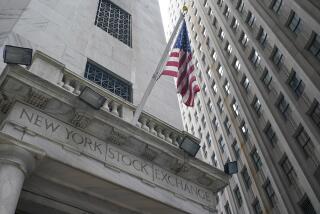Fannie, Freddie plummet
- Share via
NEW YORK — Fresh concerns about the troubled housing and mortgage markets were triggered Thursday by speculation that the government would be forced to bail out Fannie Mae and Freddie Mac, the twin pillars of the home loan industry.
Analysts worry that the mortgage giants won’t be able to raise enough money from investors to cover rising losses from loan defaults. Those doubts have ramped up a sell-off by investors, sending shares of both companies to 17-year lows.
Both companies are vital to the housing market, and the government is considered likely to step in to avert any potential failure through loans or guarantees of their debt. But the dramatic plunges in their stocks -- Freddie Mac has fallen 50% in just the last week -- underscore the potential for the housing downturn to extend well into next year.
“It reflects the severity of the housing crisis and the dire state of the financial system,” said Martin Fridson, head of money-management firm Fridson Investment Advisors in New York. “In contrast to the more hopeful sense of a couple months ago, the sense among investors now is that the housing crisis and difficulties in the financial system will drag on.”
Fannie Mae and Freddie Mac were chartered by the government but are private companies with publicly traded stocks. They buy or guarantee home loans and mortgage securities, and together stand behind almost half of the nation’s mortgage debt.
Their importance to the housing market has only increased in the last year as banks and others who backed mortgages have pulled back after suffering deep losses on subprime home loans.
Top officials in Washington tried to calm fears Thursday by downplaying the odds that Fannie and Freddie would have to raise money. Treasury Secretary Henry M. Paulson Jr. told the House Financial Services Committee that both companies were adequately capitalized.
“Their ability to raise capital even during times of stress is a testament to our financial institutions and to our financial system,” Paulson said.
The companies’ chief regulator, the Office of Federal Housing Enterprise Oversight, also issued a statement saying the government was monitoring the situation closely.
Nevertheless, any capital raising would dilute the ownership stakes of existing investors, and the stocks have fallen with remarkable alacrity in recent days.
On Thursday, Fannie Mae shares tumbled $2.11, or 14%, to $13.20. The company has lost one-third of its value in the last week. Freddie Mac’s stock sank $2.26, or 22%, to $8.
Richard Hofmann, an analyst at research firm CreditSights Inc., said investors were concerned that losses from loans could grow worse.
“You’re talking about a gargantuan amount of exposure,” he said.
Since late last year, Fannie Mae has raised more than $15 billion and Freddie Mac has raised $6 billion with plans for $5.5 billion more, Hofmann said. But the plunge in the stocks makes it difficult to draw cash from private investors.
Freddie’s total stock market value has sunk to less than $5.2 billion, meaning shareholders would lose half their ownership stake if the company raised the $5.5 billion it seeks.
Financial companies have raised more than $320 billion in capital in the last year, but many of the investors have lost money as the stocks have continued to slide. That has raised doubts about whether companies can raise billions more.
The steep drops in the stocks of the two mortgage companies have “probably made it much more likely that the government is going to have to do something,” said Steve Persky, chief executive of Dalton Investments, a Los Angeles-based hedge fund firm.
Concerns about Fannie and Freddie were stoked in part by comments from William Poole, former president of the Federal Reserve Bank of St. Louis, who said the firms were “insolvent” and might need government help.
Some experts on Wall Street thought that the uproar over Fannie and Freddie was excessive and that the level of fear signaled the stock market’s recent tumble could be nearing an end.
“This is what characterizes the bottoms of markets,” said Sean Mathis, managing director at Miller Mathis & Co., a New York investment bank. “People are throwing away everything.”
Congress continued to move forward on foreclosure prevention legislation that supporters say could help stabilize the mortgage market.
On Thursday, the Senate voted 84-12 on a procedural motion to move the housing package through the Senate. But it remains to be seen whether the Senate and House can agree on provisions of a joint bill that will pass both chambers and still receive President Bush’s signature.
Rep. Barney Frank (D-Mass.), the bill’s sponsor in the House, said his chamber was likely to make more changes next week. “If all works well, we will send [the Senate] back a bill that they can accept without any changes,” Frank told reporters.
A key provision of the pending legislation is tighter oversight of Fannie and Freddie, designed to forestall the accounting and capital problems the two companies have experienced in recent years.
Also at issue in the legislation is the size of the loans that Fannie and Freddie will be able to purchase. The Senate version limits mortgages to $625,000, while House members prefer the cap as high as $730,000. Higher loan limits tend to make mortgages more available to consumers in high-cost states such as California.
It remains to be seen whether Bush will sign the bill if it reaches his desk. The White House has taken issue with a provision that would dedicate $3.9 billion to community development grants to help cities buy and fix up foreclosed properties, arguing that it helps banks more than it helps homeowners.
--
maura.reynolds@latimes.com
Hamilton reported from New York and Reynolds reported from Washington.
More to Read
Inside the business of entertainment
The Wide Shot brings you news, analysis and insights on everything from streaming wars to production — and what it all means for the future.
You may occasionally receive promotional content from the Los Angeles Times.










